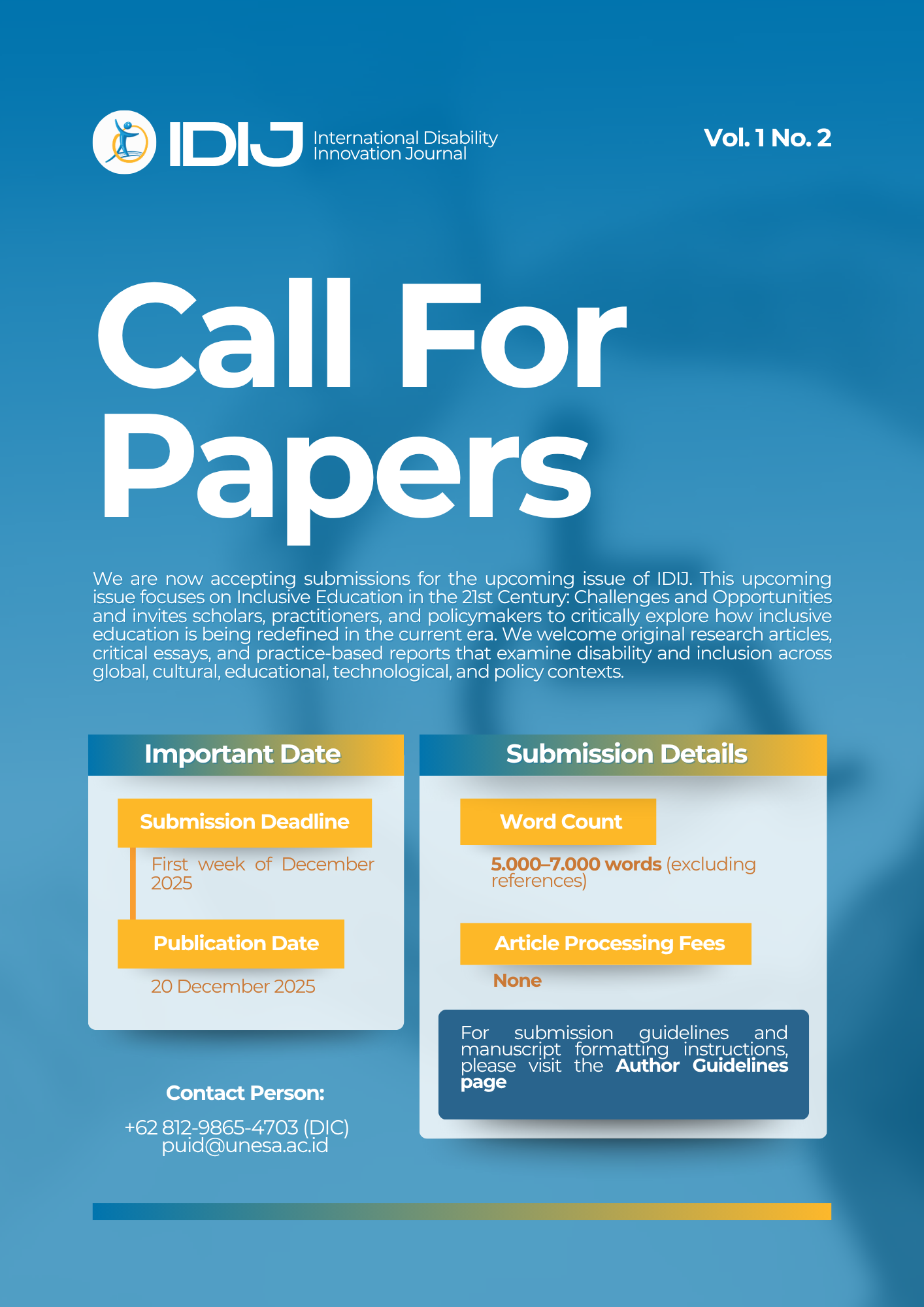POLICIES Focus and ScopeEditorial TeamReviewerAuthor GuidelinesPublication EthicsInformed ConsentPeer Review ProcessPeer Review PoliciesPublication EthicsAuthor FeeOpen Access Policy Manuscript Template


.png)
.png)
The International Disability Innovation Journal (IDIJ) is a peer-reviewed academic publication that examines disability-related issues, the rights of individuals with disabilities, inclusive education, and innovative strategies for advancing accessibility and inclusion in society. It highlights research on novel approaches, assistive technologies, and policies that drive progress in disability studies and promote a more equitable world. It is published by the Disability Innovation Center, under the Center of Research and Disability Services at Universitas Negeri Surabaya, Surabaya. This journal welcomes high-quality, research driven submission from diverse discipline, emphasising scientific inquiry and innovation approaches to disability studies, accessibility and inclusion.
International Disability Innovation Journal (IDIJ), under the Disability Innovation Center (DIC) at Universitas Negeri Surabaya (UNESA), has signed a Memorandum of Understanding (MoU) with the Asosiasi Profesional Ortopedagogik Indonesia (APOI) on July 22, 2025. The MoU was formalized by Prof. Dr. Sujarwanto, M.Pd. as Chairperson of APOI, and Silfia Asning Tias, Ph.D. as Editor-in-Chief of IDIJ, at UNESA Lidah Wetan Campus, Surabaya. Here is the link.
This collaboration is designed to strengthen academic cooperation in disability and inclusion studies through scientific publications. The agreement includes cooperation in article contributions, reviewer engagement, editorial participation, and journal dissemination. Valid for three years, this partnership supports mutual goals in advancing disability research and inclusive education across national and international platforms.

This issue presents interdisciplinary research examining social stigma surrounding intellectual disabilities and its impact on education, social participation, and family well-being. It also highlights innovative, evidence-based approaches to inclusive literacy that move beyond single-method instruction. Together, the articles advance adaptive, inclusive practices that challenge deficit-based perspectives and support equitable participation for persons with disabilities.
 Alyana Nur Fadillah,
Universitas Negeri Jakarta,
Indonesia
Alyana Nur Fadillah,
Universitas Negeri Jakarta,
Indonesia  Ridyah Syifani Rahmah,
universitas negeri jakarta,
Indonesia
Ridyah Syifani Rahmah,
universitas negeri jakarta,
Indonesia  Nurlaila Arifa Putri,
Universitas Negeri Jakarta,
Indonesia
Nurlaila Arifa Putri,
Universitas Negeri Jakarta,
Indonesia  Syaima Syafei,
Universitas Negeri Jakarta,
Indonesia
Syaima Syafei,
Universitas Negeri Jakarta,
Indonesia  Nafisa Amelia Putri,
Universitas Negeri Jakarta,
Indonesia
Nafisa Amelia Putri,
Universitas Negeri Jakarta,
Indonesia  Citra Ashri Maulidina,
Universitas Negeri Jakarta,
Indonesia
Citra Ashri Maulidina,
Universitas Negeri Jakarta,
Indonesia  Mohammad Arif Taboer,
Universitas Negeri Jakarta,
Indonesia
Mohammad Arif Taboer,
Universitas Negeri Jakarta,
Indonesia 
 Abstract views: 58
,
Abstract views: 58
, PDF downloads: 55
PDF downloads: 55
 Hussein Hussein,
Disability and Inclusion Specialist,
Tanzania, United Republic of
Hussein Hussein,
Disability and Inclusion Specialist,
Tanzania, United Republic of  Miriam Maganga,
Department of Educational Psychology and Curriculum Studies, The University of Dodoma, Dodoma, Tanzania,
Tanzania, United Republic of
Miriam Maganga,
Department of Educational Psychology and Curriculum Studies, The University of Dodoma, Dodoma, Tanzania,
Tanzania, United Republic of 
 Abstract views: 38
,
Abstract views: 38
, PDF downloads: 48
PDF downloads: 48
 Putri Mayang Nugroho,
Universitas Negeri Jakarta,
Indonesia
Putri Mayang Nugroho,
Universitas Negeri Jakarta,
Indonesia  Khairun Nisa ,
Universitas Negeri Jakarta,
Indonesia
Khairun Nisa ,
Universitas Negeri Jakarta,
Indonesia  Nayla Candra Kirana ,
Universitas Negeri Jakarta,
Indonesia
Nayla Candra Kirana ,
Universitas Negeri Jakarta,
Indonesia  Farhah Amalia Syahrani,
Universitas Negeri Jakarta,
Indonesia
Farhah Amalia Syahrani,
Universitas Negeri Jakarta,
Indonesia  Citra Ashri Maulidina,
Universitas Negeri Jakarta,
Indonesia
Citra Ashri Maulidina,
Universitas Negeri Jakarta,
Indonesia  Mohammad Arif Taboer,
Universitas Negeri Jakarta,
Indonesia
Mohammad Arif Taboer,
Universitas Negeri Jakarta,
Indonesia 
 Abstract views: 35
,
Abstract views: 35
, PDF downloads: 28
PDF downloads: 28
 Ketrin,
Special Education Department, University Negeri Jakarta, Indonesia,
Indonesia
Ketrin,
Special Education Department, University Negeri Jakarta, Indonesia,
Indonesia  Hana Ainiyah,
Special Education Department, University Negeri Jakarta, Indonesia,
Indonesia
Hana Ainiyah,
Special Education Department, University Negeri Jakarta, Indonesia,
Indonesia  Hani Khairunnisa,
Special Education Department, University Negeri Jakarta, Indonesia,
Indonesia
Hani Khairunnisa,
Special Education Department, University Negeri Jakarta, Indonesia,
Indonesia  Mochamad Ramadhan Gunawan,
Special Education Department, University Negeri Jakarta, Indonesia,
Indonesia
Mochamad Ramadhan Gunawan,
Special Education Department, University Negeri Jakarta, Indonesia,
Indonesia  Amanda Aulia,
Special Education Department, University Negeri Jakarta, Indonesia,
Indonesia
Amanda Aulia,
Special Education Department, University Negeri Jakarta, Indonesia,
Indonesia  Citra Ashri Maulidina,
Special Education Department, University Negeri Jakarta, Indonesia,
Indonesia
Citra Ashri Maulidina,
Special Education Department, University Negeri Jakarta, Indonesia,
Indonesia  Mohammad Arif Taboer,
Special Education Department, University Negeri Jakarta, Indonesia,
Indonesia
Mohammad Arif Taboer,
Special Education Department, University Negeri Jakarta, Indonesia,
Indonesia 
 Abstract views: 56
,
Abstract views: 56
, PDF downloads: 45
PDF downloads: 45
 Salwa Hanan Midiyati,
Special Education, Universitas Negeri Jakarta, Jakarta, Indonesia,
Indonesia
Salwa Hanan Midiyati,
Special Education, Universitas Negeri Jakarta, Jakarta, Indonesia,
Indonesia  Medina Izzaty,
Special Education, Universitas Negeri Jakarta, Jakarta, Indonesia,
Indonesia
Medina Izzaty,
Special Education, Universitas Negeri Jakarta, Jakarta, Indonesia,
Indonesia  Nahla Hayaatun Nufus,
Special Education, Universitas Negeri Jakarta, Jakarta, Indonesia,
Indonesia
Nahla Hayaatun Nufus,
Special Education, Universitas Negeri Jakarta, Jakarta, Indonesia,
Indonesia  Tania Nur Anisa Ramadhani,
Special Education, Universitas Negeri Jakarta, Jakarta, Indonesia,
Indonesia
Tania Nur Anisa Ramadhani,
Special Education, Universitas Negeri Jakarta, Jakarta, Indonesia,
Indonesia  Makhsun Intikhon,
Special Education, Universitas Negeri Jakarta, Jakarta, Indonesia,
Indonesia
Makhsun Intikhon,
Special Education, Universitas Negeri Jakarta, Jakarta, Indonesia,
Indonesia  Citra Ashri Maulidina,
Special Education, Universitas Negeri Jakarta, Jakarta, Indonesia,
Indonesia
Citra Ashri Maulidina,
Special Education, Universitas Negeri Jakarta, Jakarta, Indonesia,
Indonesia  Mohammad Arif Taboer,
Special Education, Universitas Negeri Jakarta, Jakarta, Indonesia,
Indonesia
Mohammad Arif Taboer,
Special Education, Universitas Negeri Jakarta, Jakarta, Indonesia,
Indonesia 
 Abstract views: 24
,
Abstract views: 24
, PDF downloads: 41
PDF downloads: 41

